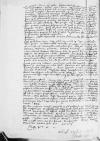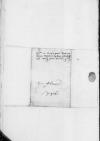Deo sit laus et gloria, qui et te hactenus servavit incolumem, et me ex periculosa legatione reduxit
cf. Fro. Caes. 1.9.7 Certe hilaris es, certe bene vales, omnium rerum certe sanus es; Fro. Caes. 3.12.1 Ego beatus hilaris sanus iuvenis denique fio, quom tu ita proficis ⌊sanum et hilaremcf. Fro. Caes. 1.9.7 Certe hilaris es, certe bene vales, omnium rerum certe sanus es; Fro. Caes. 3.12.1 Ego beatus hilaris sanus iuvenis denique fio, quom tu ita proficis ⌋. Nolo enim te nescire duodecima Aprilis hinc solvisse Cornelium, qui XX-o die mensis Maii appulit ⌊Constantinopolim⌋ rebusque confectis rursum rediit ⌊Viennam⌋ vicesimo Septembris, ubi ⌊⌋ tuas apud ⌊reverendissimum dominum Lundensem⌋ invenit, plenas illas solitae et cognitissimae mihi humanitatis tuae. Ad ⌊⌋ quid aliud respondere possum, quam habere me tibi maximas gratias, quas retributurus est omnium retributor. Cuius gratia mihi nihil deperiit hactenus, nam iacturarum fortunae et hereditatum iam pridem oblitus sum estque adhuc satis domi, quod me ab egestate tueatur. cf. Vulg. Prv 30:8 Mendacitatem et divitias ne dederis mihi, tribue tantum victui meo necessaria ⌊Divitias autem et paupertatem ne dederis mihi, Domine etc.cf. Vulg. Prv 30:8 Mendacitatem et divitias ne dederis mihi, tribue tantum victui meo necessaria ⌋.[1] Forte etiam principes nostri aliquando mutabunt sententiam, apud quos non potui noluique favorem adulationibus, delationibus blanditiisque et ceteris talibus artibus, verum sedulo agendo et bene inserviendo nullos labores, nulla pericula recusando, prospera adversa aeque ferendo parare. His artibus, quibus a pueritia vel te teste assuevi, si quid profecero, bene quidem, sin minus, abunde virtus pro praemio est. Nihil aeque cupio ac te semel invisere, sed me nunc alio
cf. Luc. 2.287 sed quo fata trahunt, virtus secura sequetur; V. Fl. 3.717 fata trahunt; Verg. A. 5.709 Nate dea, quo fata trahunt retrahuntque sequamur ⌊fata trahuntcf. Luc. 2.287 sed quo fata trahunt, virtus secura sequetur; V. Fl. 3.717 fata trahunt; Verg. A. 5.709 Nate dea, quo fata trahunt retrahuntque sequamur ⌋, hodie enim aut cras omnino per equos dispositos sum profecturus ad ⌊Hispanias⌋ per ⌊Flandriam⌋, ubi non haerebo supra quam triduum, nam res istae tanti sunt momenti, ut ex illis totus orbis,
cf. Liv. 9.19.15, 28.39.11, 36.7.7 ⌊absit
verbo
invidiacf. Liv. 9.19.15, 28.39.11, 36.7.7 ⌋, quasi dependeat, cf. Verg. A. 12.764-765 neque enim levia aut ludicra petuntur praemia ⌊
nec enim levia aut ludicra petuntur praemiacf. Verg. A. 12.764-765 neque enim levia aut ludicra petuntur praemia ⌋, ut ⌊poeta⌋ ait.
Ut vero intelligas, quo in statu res sint, nam multa vana et ficta malis hominibus circumferuntur, adque tui et bonorum omnium, in quorum pectoribus situs est Crucifixus
cf. Vulg. 3Rg 19:18 et derelinquam mihi in Israhel septem milia universorum genua quae non sunt incurvata Baal ⌊quique genua sua nondum incurvarunt ante ⌊Baal⌋cf. Vulg. 3Rg 19:18 et derelinquam mihi in Israhel septem milia universorum genua quae non sunt incurvata Baal ⌋
, consolationem haec accipe brevibus. Anno superiore, postquam ⌊caesar Thurcarum⌋ recessit ex ⌊Hungaria⌋, misit serenissimus Rhomanorum, ⌊Hungariae⌋, ⌊Bohemiae⌋ ⌊rex Ferdinandus⌋ per viam ⌊Rhagusii⌋ ⌊Hieronymum de ⌊Zara⌋⌋ equitem, bonum et strenuum virum et variarum linguarum peritia adhaec longo usu apud ⌊Thurcas⌋ dignum admiratione. ⌊Hic⌋ in eo statu res apud ⌊Thurcas⌋ invenit, ut de honorifica pace iam tractarit, non tamen definitive cum ⌊Ferdinando rege⌋ neque aspernatus sit ⌊Thurca⌋ ⌊Karolum etiam caesarem⌋ in ea comprehendi, modo vellet. Proinde missus est ab eodem ⌊Thurcarum caesare⌋ huc ex zawssis[2] ipsius unus, qui aliquando apud vos fuit, rescitum, verane proposuisset ⌊Hieronymus⌋. Ego tunc ⌊Viennae⌋ eram cum ⌊reverendissimo domino Lundensi⌋ nomine ⌊caesaris⌋ uterque orator. Visum est itaque ⌊caesari⌋ iam facto de iis omnibus certiori, ut fratri suo ⌊Ferdinando⌋ inservirem, me conferrem ⌊Constantinopolim⌋.
cf. Suet. Jul. 37.2; Plut. Paral. Caes. 50 Veni, vidi, vici ⌊Parui, veni, vidicf. Suet. Jul. 37.2; Plut. Paral. Caes. 50 Veni, vidi, vici ⌋.
Repperi quaedam turbatiora, quam speraveram, nam mali aliquot Christiani pro sua virili rem conati erant subvertere, quod in parte etiam fecerant. Tandem cum ⌊Imbrahimo Bassa⌋ et ⌊Aloisio Gryti⌋, penes quos summa rerum est omnium, frequenter congressi, Deo volente, in praesentia magni ⌊caesaris Thurcarum⌋ conclusimus firmam et honestam et longam pacem inter praefatum magnum caesarem et ⌊Ferdinandum regem⌋, ipsorum regna et dominia. Conclusa est autem haec pax vicesima tertia Iunii in cubiculo praefati magni ⌊caesaris⌋ in praesentia ipsius et trium bassarum summorum (nam quartus, paulo antequam venirem, obierat diem) ⌊Hieronymo⌋ et Cornelio agentibus.
De cuius pacis condicionibus haec habe: durabit non per quattuor vitas, ut vestra, quam conclusit ⌊Opalynsky⌋, sed
in perpetuum, donec enim ipsam ⌊Ferdinandus rex⌋ servaverit et sui heredes et successores, tamdiu eam ⌊domus Othomanna⌋ iuravit servare omni sine fraude et sedatis etiam minimis incursionibus. Aliam enim et firmiorem nobiscum servare promisit, quam cum aliis, puta cum ⌊Venetis⌋ et vobiscum. Ita locutus est ore suo et ipse ⌊caesar⌋, et ⌊Imbrahimus Bassa⌋, quorum caesar Ferdinandum in filium, Imbrahimus Bassa in fratrem suscepit. Quaecumque habet Ferdinandus, retinet et retinebit sine ullo tributo soluto aut solvendo, aut ulla angaria qualicumque. De toto autem ⌊regno Hungariae⌋ assequendo spes illi non parva facta est. De qua spe neque ⌊Lasky⌋ vester, neque quisquam praeter quattuor, inter quos ⌊Hieronymus de Zara⌋ et Cornelius Duplicius Scepperus duo sunt, quicquam omnino novit. Scio, quid scribatur, quid dicatur, sed veritas elucebit et cf. Vulg. Mt 11:15, 13:9:1; Vulg. Lc 8:8:3, 35:3; Vulg. Mc 4:9:1, 4:23:1, 7:16:1 ⌊qui habet aures audiendi, audiatcf. Vulg. Mt 11:15, 13:9:1; Vulg. Lc 8:8:3, 35:3; Vulg. Mc 4:9:1, 4:23:1, 7:16:1 ⌋,
cf. Vulg. Cor2 6:15 Qui sordet sordescat; Vulg. Apc 22:11 Qui nocet, noceat adhuc: et qui in sordibus est, sordescat adhuc: et qui iustus est, iustificetur adhuc: et sanctus, sanctificetur adhuc ⌊qui autem sordet, sordescatcf. Vulg. Cor2 6:15 Qui sordet sordescat; Vulg. Apc 22:11 Qui nocet, noceat adhuc: et qui in sordibus est, sordescat adhuc: et qui iustus est, iustificetur adhuc: et sanctus, sanctificetur adhuc ⌋,
cf. Vulg. Cor1 1:19 Scriptum est enim: perdam sapientiam sapientum, et intelligentiam intelligentum auferam e medio; Vulg. Is 29:14 Ideo ecce ego addam, ut admirationem faciam / populo huic miraculo grandi et stupendo; / peribit enim sapientia a sapientibus eius, / et intellectus prudentium eius abscondetur ⌊adhuc prope est enim iudicium ipsius, et perdet Deus sapientiam sapientum, et prudentiam prudentum confundetcf. Vulg. Cor1 1:19 Scriptum est enim: perdam sapientiam sapientum, et intelligentiam intelligentum auferam e medio; Vulg. Is 29:14 Ideo ecce ego addam, ut admirationem faciam / populo huic miraculo grandi et stupendo; / peribit enim sapientia a sapientibus eius, / et intellectus prudentium eius abscondetur ⌋. Pollicetur ⌊caesar Thurcarum⌋ auxilia ⌊Ferdinando⌋ filio suo adversus quoscumque.
Haec est summa rerum neque plus, neque minus est. Ego numquam credidissem ⌊hanc gentem⌋ iis condicionibus venturam ad pacem, venit tamen. In qua re nihil nisi voluntas Dei intermedium fuit, neque enim ibi quicquam valet dexteritas, eloquentia, prudentia, adulatio, blanditiae nec subtilitas, sed mera voluntas barbara, nec locum habent ibi parva logicalia, nec ⌊Petrus Hispanus⌋, nec „Rhetorica” ⌊Tullii⌋, ⌊Bartoldi⌋ aut ⌊Augustini Dathi⌋, sed
cf. Juv. 6.223 Hoc volo, sic iubeo, sit pro ratione voluntas ⌊sic volo, sic iubeo, sit pro ratione voluntascf. Juv. 6.223 Hoc volo, sic iubeo, sit pro ratione voluntas ⌋. Itaque ex mera ipsorum voluntate hanc pacem dedere. In qua adhuc poterit ⌊Karolus caesar⌋ contineri, si volet, nam priore hac vice de se nullam voluit mentionem fieri.
Quaeres, quid mihi videatur aut quae res potest ⌊illos⌋ impulisse. Dicam: ⌊ipsi⌋ fatentur se centum triginta milia hominum superioris anni expeditione amisisse, rediere sine praeda, sine gloria. Animi ⌊Graecorum⌋ et ceterorum Christianorum erecti sunt ad res novas. ⌊Tagmats⌋ ⌊Sophy Ismahelis⌋ filius urget ab ⌊Asia⌋. Ad ⌊eum⌋ transfugiunt nullo non die multi janitzari. Numquam credidissem tam parvas vires esse magni ⌊illius hostis⌋. Atque ego eas esse scio et vidi, et iterum dico: scio.
Dum expediti essemus iamque urbs ⌊Coron⌋ in ⌊Peloponneso⌋ extrema penuria laboraret, quam terra marique obsessam per novem menses tenuerant, subito advenit ⌊Andreas de Auria⌋ cum parte classis caesareae (nam viginti triremes Hispanae nondum advenerant) sextaque die Augusti per mediam classem ⌊Thurcarum⌋ profectus nulla navi amissa in civitatem venit. Septima die sanzachus ⌊Moreae⌋ solvit obsidionem terrestrem. Octava die ⌊Graeci⌋, qui cum ⌊Hispanis⌋ ⌊Corone⌋ erant, eos insecuti magna strage affecere. ⌊Urbe⌋ firmata impositoque novo praesidio et commeatu rediit ⌊Andreas⌋ classe ⌊Thurcarum⌋, quae in duplo maior erat, nu{n}squam comparere audente, sed munitissimis locis se continente, felix et victor. Haec sunt, quae te scire volui, et haec vera sunt, quare lauda Dominum et
cf. Vulg. Apc 17:7-8 Et dixit mihi angelus: Quare miraris? Ego tibi dicam sacramentum mulieris et bestiae, quae portat eam, quae habet capita septem et decem cornua. Bestiam, quam vidisti, fuit et non est, et ascensura est de abysso, et in interitum ibit, et mirabuntur inhabitantes terram, quorum non sunt scripta nomina in libro vitae a constitutione mundi, videntes bestiam, quia erat et non est. ⌊brevi videbis interitum Bestiaecf. Vulg. Apc 17:7-8 Et dixit mihi angelus: Quare miraris? Ego tibi dicam sacramentum mulieris et bestiae, quae portat eam, quae habet capita septem et decem cornua. Bestiam, quam vidisti, fuit et non est, et ascensura est de abysso, et in interitum ibit, et mirabuntur inhabitantes terram, quorum non sunt scripta nomina in libro vitae a constitutione mundi, videntes bestiam, quia erat et non est. ⌋.
⌊Pontifex maximus⌋, incertum quibus de causis, confert se non ⌊Nicium⌋ ⌊Provinciae⌋, sed ⌊Massiliam⌋ ad ⌊regem Francorum⌋.
cf. Vulg. Ps (G) 7:12:1 Deus iudex iustus et fortis et patiens; Vulg. Ps (H) 7:12:1 Deus iudex iustus et fortis; Vulg. 2Tim 4:8:2 Dominus in illa die iustus iudex ⌊Deus sit ⌊illi⌋ iustus iudexcf. Vulg. Ps (G) 7:12:1 Deus iudex iustus et fortis et patiens; Vulg. Ps (H) 7:12:1 Deus iudex iustus et fortis; Vulg. 2Tim 4:8:2 Dominus in illa die iustus iudex ⌋. Qui te, ⌊matrem⌋, ⌊sorores⌋, propinquos et affines et ⌊fratres⌋ diu servet incolumem, quibus omnibus cupio ex animo commendari. ⌊Reverendissimus dominus Lundensis⌋ se Dominationi Vestrae Reverendissimae plurimum commendat, cui ulteriorem scribendi provinciam relinquo, nam ego ad postas.
Iterum vale, Domine et pater honorandissime. Scribe, scribe, nam intra tres menses iterum hic sum futurus. Rursus vale.


